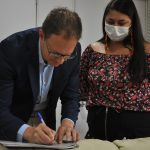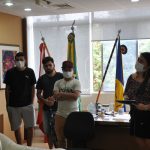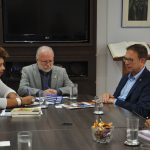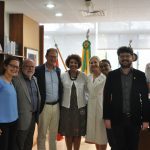The Scientific Panel for the Amazon (SPA), a group that brings together more than 200 scientists, released this Friday, 12 November, the first Amazon Assessment Report. Presented in Glasgow, Scotland, at a parallel event to the United Nations Conference on Climate Change, Cop26, the document warns that the Amazon is approaching a potential and catastrophic point of no return, due to deforestation, degradation, forest fires and climate change, and calls on global governments, public and private sector leaders, policy makers and the general public to act now to prevent further devastation in the region.
According to the SPA, this is the most detailed, comprehensive and holistic material of its kind on the Amazon Basin. In its 34 chapters, it provides a systematic overview of the state of ecosystems and peoples in the Amazon and offers policy makers recommendations for the conservation of this ecosystem and paths for the sustainable development of the region. It also highlights the importance of science, technology, innovation, indigenous peoples and local knowledge to guide decision-making and policy-making.
“What this report does, its role, is like an IPCC [Intergovernmental Panel on Climate Change] for the Amazon. So, this is the first time that a review of things happening in the Amazon, about the condition of the Amazon today, has been done like this, in this way, with several researchers”, comments the professor at the Department of Physics at the Universidade Federal de Santa Catarina (UFSC) Marina Hirota, one of the authors of the document.
The study’s structure is divided into three parts. The first presents the factors that determined the evolution of the Amazon to what we know today, including geological, climatic and human aspects. The second section discusses how human actions are affecting the biome. Issues such as deforestation, fire and climate change, land use and rainfall patterns, as well as their impacts on biodiversity, ecological processes, ecosystem services and human well-being, are addressed. The work ends with an indication of sustainable solutions and paths for the future.
On the brink of collapse
The Amazon Basin encompasses the largest tropical forest in the world and immense natural and cultural wealth and diversity. In addition to playing a decisive role in global water cycles and regulating climate variability, the Amazon is also home to approximately 47 million people, including some 2.2 million indigenous people, distributed in more than 400 groups that speak more than 300 languages.
The region, however, faces unprecedented changes. There are already parts of the Amazon that behave in a new configuration, that act as a carbon source rather than a sinkhole, or that have become a type of impoverished savannah. Amazonian peoples, their cultures and knowledge are also under threat due to multiple pressures and the weakening of the protection of their rights.
Approximately 17% of the original Amazon area has already been deforested and 18% is degraded (meaning that there may even be trees standing in these places, but disturbances such as fire and illegal logging have led to impoverishment of the forest, with loss of biodiversity and reduction of ecological functions, for example). We are very close to what some studies indicate as the limit of 20% to 25% of change in the biome’s vegetation cover – from then on, theoretical models indicate that the forest would no longer be able to recover.
Points of no return (also called tipping points) refer to the limits beyond which the system would collapse and are the focus of the chapter in the report led by Marina. The scientists’ analysis shows that there are points related to different variables – such as the amount of rain, the increase in the length of the dry season, the global temperature, and, of course, the level of deforestation.
The hypotheses about what could happen to the Amazon – and the planet – after crossing one of these points are also varied. Although there is no consensus on exactly what the impacts will be, it is known that they will certainly be felt in many places. Disturbances in such a large forest spread across the world in a domino effect.
“There will be changes in rainfall patterns, in general, in the Southeast and South of Brazil. Whether for more or for less, this still needs to have a consensus, but there will be. Things have a flow, and the flow of moisture that comes from the Atlantic Ocean and passes through the Amazon is an important flow in providing water that can fall anywhere in Brazil and South America, in general. So there will be changes in temperature and rainfall regardless of climate change. Then, we need to see which direction in a more consensual way”, explains Marina.
The forest is connected to other critical elements of the Earth system. Changes in the Amazon Basin could affect the circulation of the Atlantic Ocean and ice melt in Antarctica and the Arctic. “The fact is that temperature and rain can change elsewhere in the world. And these tipping elements [elements of the planet, interconnected with each other, which are subject to abrupt and catastrophic changes after crossing certain thresholds] can, in a cascade effect and on a more global scale, accelerate changes in other places”, reinforces the professor.
It is noteworthy that it is not just a matter of avoiding a complete collapse, even smaller and more localized disturbances can cause enormous damage. “We need to manage the resilience of the Amazon, including considering the people who live in the Amazon. Who lives in the Amazon depends on what the Amazon provides. We have to think about it a lot. It does not matter whether there is going to be a systemic collapse or not within the Amazon, even if they are small collapses, this will have a very large impact on the cultural diversity that exists there. These people are going to lose the house they have today”, reiterates Marina.
Red flags
The SPA recommends, to decision makers, an immediate moratorium on deforestation in areas that are already approaching points of no return and that deforestation and degradation be zeroed in the entire Amazon region by 2030. On the subject, Mercedes Bustamante, professor at the Universidade de Brasília (UnB) and member of the Scientific Steering Committee of the SPA, is emphatic: “With the recent outbreaks of deforestation that are devastating the most extensive tropical forest on the planet, we must also announce a red alert for Amazon. Saving forests from ongoing deforestation and degradation and restoring ecosystems is one of the most urgent tasks of our time to preserve the Amazon and its populations and address the global risk and impacts of climate change. The mosaic of Amazonian ecosystems extends from the high Andes to the Amazonian lowlands and is home to the most extraordinary biodiversity on Earth, with more than 10% of the plant and animal species in the world”.
“The great biodiversity of the Amazon will not continue, not only of plants, but of animals, and also the diversity of humans, cultures, languages, native peoples, with the intense anthropogenic pressure that we are experiencing, especially in relation to deforestation”, emphasizes Marina Hirota. “We need to achieve zero deforestation as quickly as possible. What [the report] says is ten years at most, but I think less than that. I would say zero deforestation as quickly as possible, with public policies, but also with inspection in loco, because there are many illegal activities in the Amazon, and the report talks a lot about that too”, he adds.
The teacher also draws attention to the need to value traditional peoples, such as indigenous peoples and riverside communities, who are at the forefront of the political and social struggle that exists today in Brazil. “Keeping native peoples where they are helps us keep the forest standing. It sounds a little romantic, but they are true guardians of the forest.”
Solutions and ways forward
Despite the alarming findings, the report highlights the significant potential of advancing paths to sustainable development based on a combination of scientific research and knowledge of indigenous peoples and local communities, emphasizing the importance of collaboration and leveraging strong partnerships. It takes the combined and collaborative efforts of Amazonian policy makers at the central and local levels, the financial and private sectors, civil society and the international community.
The SPA highlights that the size and challenges of the Amazon Basin require large-scale international financial development and public and private partnerships to promote and sustain restoration, conservation, forest management, development of sustainable value chains and payment for schemes ecosystem services, as well as investment in education, science, technology and innovation. Financial support must be mobilized from advanced economies, ensuring that their consumption is linked to areas with zero deforestation and preserving the role of forests as an important natural carbon sinkhole.
Among the most urgent actions, in Marina’s view, are the demarcation of indigenous lands and the inspection of mining, deforestation and invasion of protected areas. Managing the resilience of the Amazon involves public policies at different levels of governance and open conversations between different sectors of society. It must be made clear that there is no need to cut down more forests for agricultural expansion, for example. This can be done in areas that are already deforested and degraded and through investment in new technologies.
The Panel advocates the vision of a living Amazon that promotes conservation and restoration initiatives, a transformation to an innovative bioeconomy of healthy standing forests and flowing rivers that respects and recognizes natural cycles and human rights. “If we keep the forest standing, it can make a lot more profit than if it’s fallen”, emphasizes Marina.
The change, she says, also involves the awareness of the population. “It’s a huge ecosystem, which has several sub-ecosystems. It’s hard to understand if you’ve never been there, the connectivity that exists in the Amazon is very different. Even if people don’t know this and are used to other perspectives of life in space and time, I think it’s very important for us to have empathy. Because what’s happening over there it is going to happen to everyone at some point. It is happening there because there is still forest there, but also in other places that have forest or any natural ecosystem, the pressure is very high. Just look away and see what ecosystem around you is changing and what impact it has on your life. In the Amazon, this is happening to local people and it will reach us at some level.”
Marina illustrates the issue with some recent examples of environmental problems in Santa Catarina, such as increasing deforestation and leakage caused by the rupture of a sewage structure in Lagoa da Conceição. “All these things that we can see here, imagine that multiplied by thousands, so that we can have an idea of the size of the Amazon. That doesn’t mean it’s more or less important, it means that it impacts our lives on one level or another. And what happens here in Santa Catarina also reverberates and spreads to other places in Brazil, even if at a lower level, due to the size of the state compared to the Amazon, which encompasses several states. We have to create this sense of belonging that we are in one country. A part of the Amazon is in Brazil. We are together in this.”
Scientific Panel for the Amazon
Inspired by the Pact of Letícia for the Amazon, the SPA aims to be a scientific authority on various topics related to the Amazon Basin. The Panel is organized by the United Nations Sustainable Development Solutions Network (SDSN) and involves more than 200 scientists – of which two thirds are from Amazonian countries – including indigenous leaders.
In addition to Marina, three other UFSC researchers participated in the elaboration of the report: postdoctoral fellows from the Postgraduate Program in Ecology ,Bernardo Monteiro Flores and Carolina Levis, and professor at the Department of Phytotechnics Ana Catarina Conte Jakovac.
For more information, visit the SPA website, the report and its executive summary.Summary versions of all chapters are accessible in English. They are also being, little by little, being translated into Portuguese, and some are already available on the website aamazoniaquequeremos.org/capitulos-em-sintese.
Camila Raposo/Journalist at Agecom/UFSC, with information from the Scientific Panel for the Amazon (SPA)
Translated by SINTER/UFSC
Read the original article here.

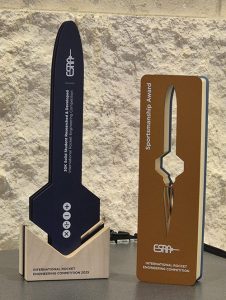





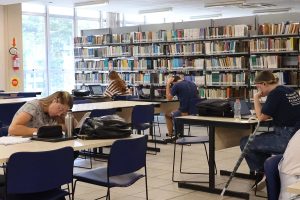
 The Universidade Federal de Santa Catarina is studying partnerships in specialized areas with seven universities, three from Japan and four from Singapore. The networking began during an international mission that lasted 15 days and ended on 26 November. The Prorector for Research and Innovation, Jacques Mick, was part of the group led by the Support Foundation for Research and Innovation of the State of Santa Catarina (Fapesc) and by the Santa Catarina Association of Educational Foundations (Acafe). The visit was sponsored by the Santa Catarina government, interested in expanding the mechanisms of cooperation between the state, universities, and the private sector to promote development.
The Universidade Federal de Santa Catarina is studying partnerships in specialized areas with seven universities, three from Japan and four from Singapore. The networking began during an international mission that lasted 15 days and ended on 26 November. The Prorector for Research and Innovation, Jacques Mick, was part of the group led by the Support Foundation for Research and Innovation of the State of Santa Catarina (Fapesc) and by the Santa Catarina Association of Educational Foundations (Acafe). The visit was sponsored by the Santa Catarina government, interested in expanding the mechanisms of cooperation between the state, universities, and the private sector to promote development. On 5 December, members of the Central Administration had a meeting with the Consul General at the U.S. Consulate General in Porto Alegre, Shane Christensen, and the Cultural Attaché, Beata Angelica, at the Rector´s Office. The meeting aimed at discussing the resource feasibility for the implementation of the indigenous student residence project at the Universidade Federal de Santa Catarina (UFSC), Florianópolis Campus.
On 5 December, members of the Central Administration had a meeting with the Consul General at the U.S. Consulate General in Porto Alegre, Shane Christensen, and the Cultural Attaché, Beata Angelica, at the Rector´s Office. The meeting aimed at discussing the resource feasibility for the implementation of the indigenous student residence project at the Universidade Federal de Santa Catarina (UFSC), Florianópolis Campus.